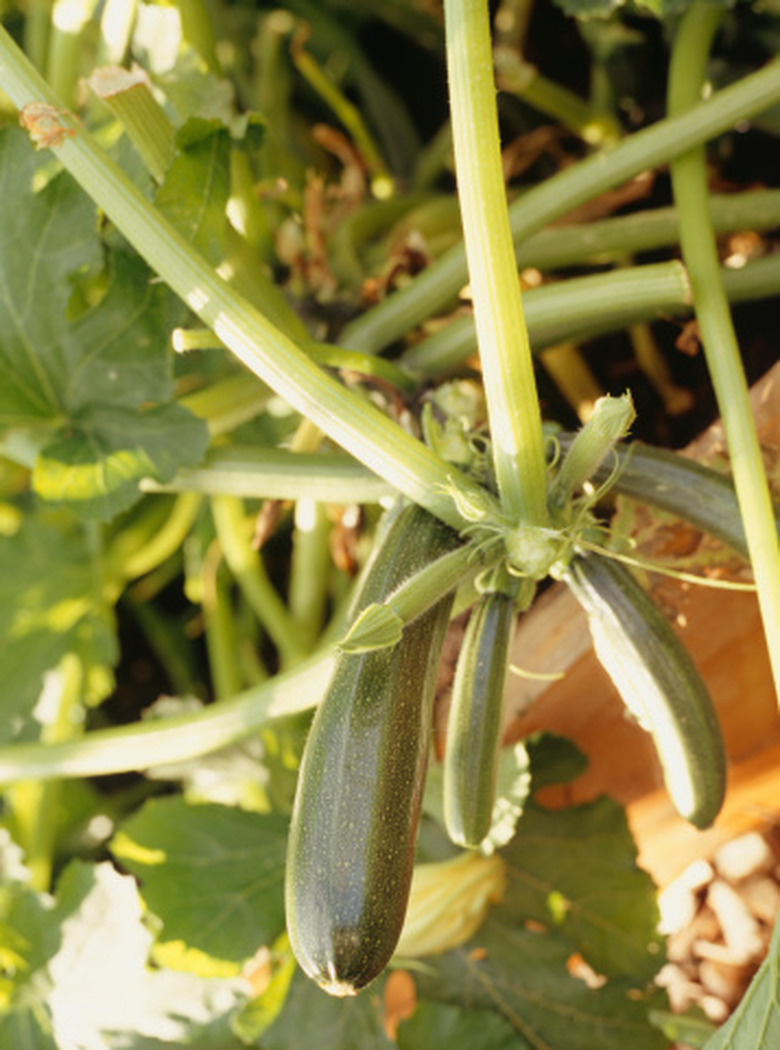What Is Killing My Squash & Zucchini Plants?
Zucchini and other squash are home garden staples, grown in backyard vegetable patches all over the United States. They are relatively easy to grow, but like most vegetables, squash are prone to various plant diseases and insect pests.
Zucchini and other squash are home garden staples, grown in backyard vegetable patches all over the United States. They are relatively easy to grow, but like most vegetables, squash are prone to various plant diseases and insect pests. If your squash plants are dying, a number of different culprits could be responsible.
Plant Diseases
Bacterial wilt is a common plant disease that affects squash, causing leaves to wilt and die. Infected stems will contain sticky, milky sap, which is a sure sign of infection. Destroy all infected plants to keep the disease from spreading. Fungal infections like downy mildew, powdery mildew and sooty mold can also kill plants. These diseases are promoted by hot, wet conditions and can be transmitted by some insects. Proper watering and good air circulation around squash plants help to prevent fungal infections. Controlling insects like aphids also lessens the likelihood of fungus, as well as viruses. Squash varieties are available with resistance to most common plant diseases.
- Zucchini and other squash are home garden staples, grown in backyard vegetable patches all over the United States.
- Bacterial wilt is a common plant disease that affects squash, causing leaves to wilt and die.
Squash Bugs and Vine Borers
Squash bugs and squash vine borers are two of the most serious insect pests in squash. Squash bugs feed on leaves and stems by piercing the surface and drinking the sap. To eliminate squash bugs, place boards or shingles under the plants; the insects will hide under the wood at night, and you can collect and destroy them by every morning. Larvae can be killed with insecticides containing carbaryl. Squash vine borers bore into stems near ground level and feed on the vines from the inside, potentially killing the plants. Control borers by spraying Bacillus thuringiensis var. kurstaki around the base of the stems once a week.
- Squash bugs and squash vine borers are two of the most serious insect pests in squash.
- Squash vine borers bore into stems near ground level and feed on the vines from the inside, potentially killing the plants.
Aphids, Spider Mites and Whiteflies
Aphids are among the most common insect pests on a wide range of garden plants. Though they rarely cause significant damage to squash themselves, they may transmit viruses, and they leave waste products that promote the growth of fungus. The best way to deal with aphids is to promote lacewings, ladybugs and other insects that prey upon them. This means avoiding the use of broad-spectrum insecticides if possible. Spider mites and whiteflies also feed on squash plants, usually hiding under the leaves. Insecticide soap will kill aphids, along with spider mites and whiteflies. Dilute the soap and avoid spraying in hot weather, as this can lead to leaf scorch.
- Aphids are among the most common insect pests on a wide range of garden plants.
- Insecticide soap will kill aphids, along with spider mites and whiteflies.
Environmental Issues
Like all plants, squash have certain environmental requirements. Squash planted in adverse conditions rarely thrive and may not even survive. Good drainage is important — soggy, poorly drained soil can suffocate the roots, eventually killing the plants. Avoid wet sites, especially where water pools after a hard rain. Squash are also cold-sensitive and can be severely damaged by frost or subfreezing temperatures.
References
- University of Arizona Cooperative Extension; Zucchini: A Treat in the Heat; Laurel Reade; 2003
- Iowa State University; Growing Squash in the Home Garden; Richard Jauron; 2003
- Rutgers Cooperative Extension; Summer Squash and Zucchini Squash IPM Field Guide; W.L. Kline, et al.
- University of Illinois Extension: Vegetable: Summer Squash
